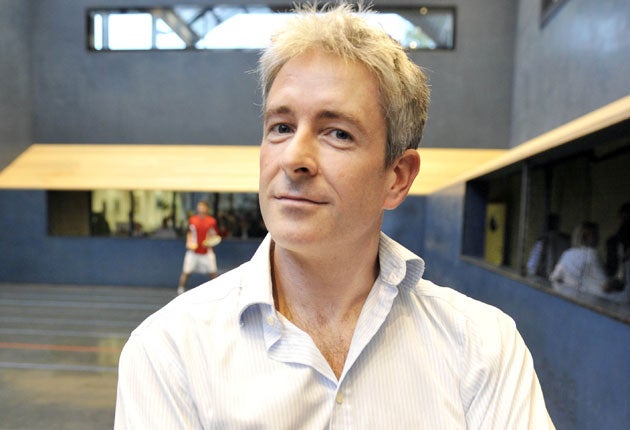Forget Henry VIII, here is the king of real tennis
A world champion for 15 years, Fahey is chasing his 40th Grand Slam crown

Eat your heart out, Roger Federer. The Swiss may have passed Pete Sampras' all-time record of 14 Grand Slam titles this summer but he is little more than a beginner compared with Rob Fahey. When the 41-year-old Australian travels to Bordeaux to play in the French Open later this month he will be looking for his 40th Grand Slam trophy.
World champion since 1994, Fahey is the undisputed king of real tennis, the favoured pastime of many a royal patron, most notably Henry VIII. The forerunner to lawn tennis, real tennis is the game from which most other racket-and-ball sports are derived. Today only 6,000 people play it worldwide, two-thirds of them in Britain, where more than half the planet's 45 real tennis courts are to be found. Australia, the United States and France are the only other countries where it is played.
Fahey is based in Hendon at Middlesex University, which boasts one of the finest real tennis facilities in the world. He was holding court there on Thursday at "The Real Ten", an evening of exhibition matches at which members of the public were invited to try their hands at a sport which can be traced back to the 12th century.
The Hendon club is on a membership drive, with one of its goals to shed the impression that it is an elitist sport. Full membership costs just £300 a year, while court fees are only £12 an hour, which is considerably cheaper than at many indoor lawn tennis centres.
A real tennis court looks similar to its lawn tennis equivalent, with a net draped across the middle, but, as in squash, you can strike the ball against the side and back walls. Much of the art is in working out where the ball is going to land as it flies off the sloping roofs.
The hand-made balls are much harder than lawn tennis balls and do not bounce as high, while the rackets are considerably heavier. The top players hit with huge power and even the best can suffer painful blows when struck by the ball.
"Because it's played with walls it's a lot harder to know where the ball's going to be," Fahey said. "That's a whole new dimension for lawn tennis players. The rules also mean that you're always being put into situations where you have to decide whether to leave a ball or hit it.
"It's not as confusing as it first sounds, but you certainly need patience to start with. You can get a fair way by using your brain, but at the top level you also have to be a great athlete. There's probably more strength involved than in squash and tennis. You're constantly down low in a bent position, because the ball hardly bounces and the balls and the rackets are heavier."
Compared with lawn tennis, real tennis players have many more choices in terms of which shot to play, which is part of the reason why a 41-year-old is still world champion.
"You might have 10 options on every ball, but you're not going to be good enough to play all 10 to the same standard," Fahey said. "So intellectually, you figure out your own game and keep it as basic as possible. People talk about it as a game of chess, but in the end a lot of it is instinctive. When the ball's coming at you at 150mph you don't have the time to figure out your chess move."
Fahey won his first Grand Slam title in 1993 – the major tournaments mirror those in lawn tennis – and his first world championship the following year. The world champion defends his title every two years against a challenger in a match played over 13 sets and several days. The rules used to state that the challenger had to have won one of the Grand Slam events in the previous two years but had to be changed when Fahey won 10 in succession, meaning nobody had qualified to meet him.
The Australian, who defends his title in Melbourne next year, is one of a handful of players who make a living from the sport, most of them by working as club professionals. A winning cheque for $57,000 (about £36,000) at the 2004 US Open was his biggest pay day.
Fahey, who was a decent lawn tennis player until he discovered real tennis at 18, admits he is finding the physical challenge increasingly tough, but he is still the man to beat.
"Being a walled game is probably the thing that allows you to be a bit older," he said. "The greatest skill of all is knowing where the ball is going to be and being able to move to that point. On a lawn tennis court you just have to cover the distance and an older player like me would obviously be at a disadvantage there. In real tennis I might only have to move a step or two. It's a question of figuring it out and then getting there."
Join our commenting forum
Join thought-provoking conversations, follow other Independent readers and see their replies
Comments